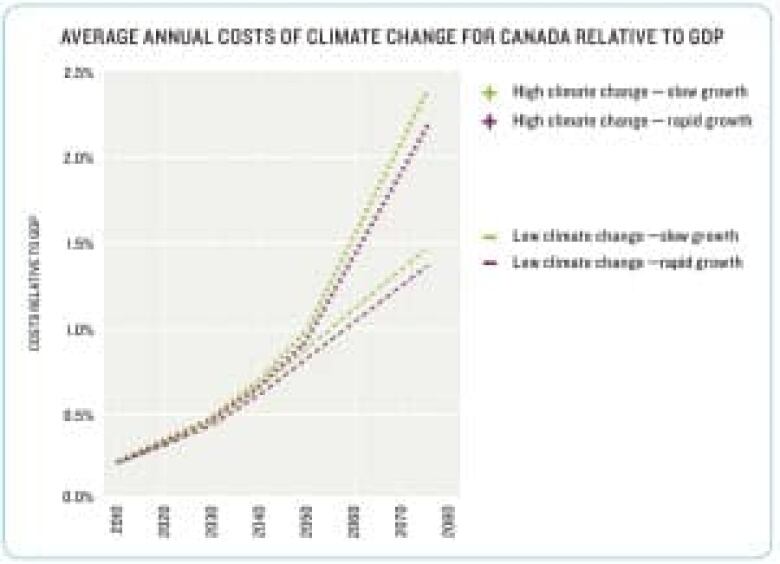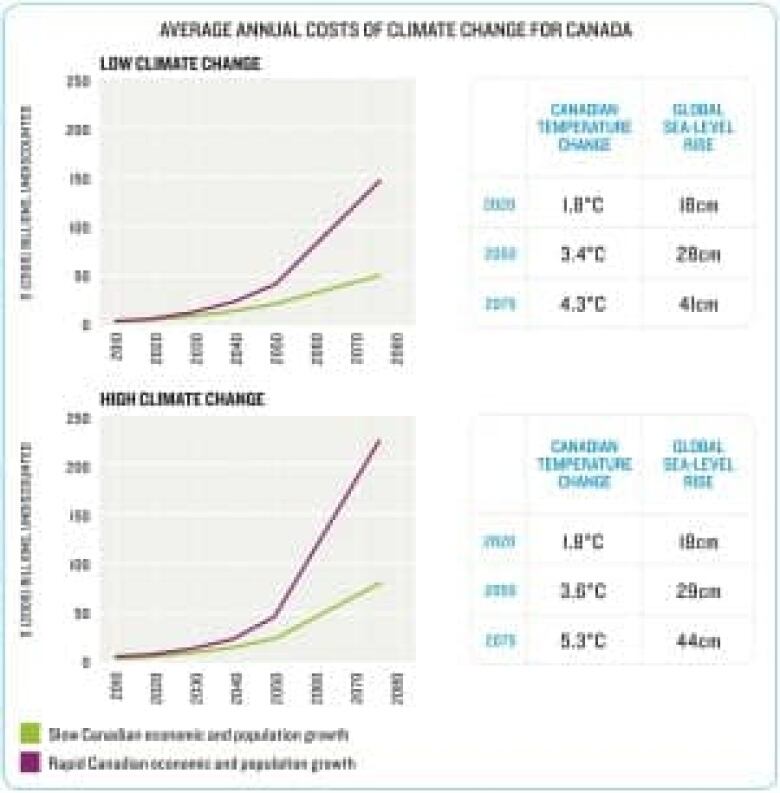Climate change could cost billions a year by 2020
Adaptation key to limiting costs, report says

Climate change could cost Canada billions a year as early as 2020, depending on how severe it is and how well the country adapts, says a report released Thursday morning.
The National Round Table on the Environment and the Economy looked at the cost of climate change on Canada's prosperity, public health and in coastal areas affected by weather events.
The government-funded think-tank estimates the cost of climate change for Canada could start at roughly $5 billion per year in 2020 and increase to between $21 billion and $43 billion per year by 2050.
The average annual cost of climate change is expected to be roughly 0.8 per centto 1.0 per cent of GDP by 2050, the report says.
It also found that climate change could result in additional deaths from heat and air pollution.

Looking at Vancouver, Calgary, Toronto and Montreal, the report projects three to six deaths per 100,000 people per year in the 2020s, with impacts worsening in future decades.
Researchers projected the cost of climate change based on four scenarios ranging from rapid population and economic growth combined with high climate change to slow population and economic growth with low climate change.
It found there was a small chance the cost could go as high as $91 billion per year by 2050 given fast growth and a great deal of change in the climate, or sit at $21 billion a year given low climate change and slow growth.

The report says adaptation is key to limiting costs.
"Global mitigation leading to a low climate change future reduces costs to Canada in the long term. This reinforces the argument that Canada would benefit environmentally and economically from a post-2012 international climate arrangement that systematically reduced emissions from all emitters including Canada over time," the report says.
The report recommends the government invest in research into the economics of climate change effectsand adaptation, model and cost out climate impacts, and work with universities and the private sector to get help with adapting to climate change.
'Huge wake-up call'
NDP environment critic Megan Leslie says the report is a huge wake-up call.
"The fact that they were able to put numbers to the impacts on health, the impacts on environment, it is a groundbreaking piece of work for Canada, because it does show what the actual costs will be for us," she said.
P.O.V.:
How should Canada pay for this?Take our survey.
"We are talking a lot about belt-tightening, but this report is really clear about the fact that if we dont act now and if we dontlay out that initial investment now, were going to pay dearlydearly in the future, with our coastlines, with floods and fires, but also with health."
Leslie said the government's sector-by-sector approach to cutting greenhouse gas emissions isn't working, while they're ending programs that do work, like the Eco-Energy Retrofit. She said Canada needs a climate change strategy.
"The approach we're taking just doesn't make any sense and this report shows that we're going to pay dearly for this in the future."
Environment Minister Peter Kent says the government has already set aside money for adaptation, including $58 million in the last budget.
"Today's report merely echoes what our government has long recognizedthat is, the importance of adaptation to climate change," Kent said in response to a question in the House of Commons.












_(720p).jpg)


 OFFICIAL HD MUSIC VIDEO.jpg)
.jpg)



























































































